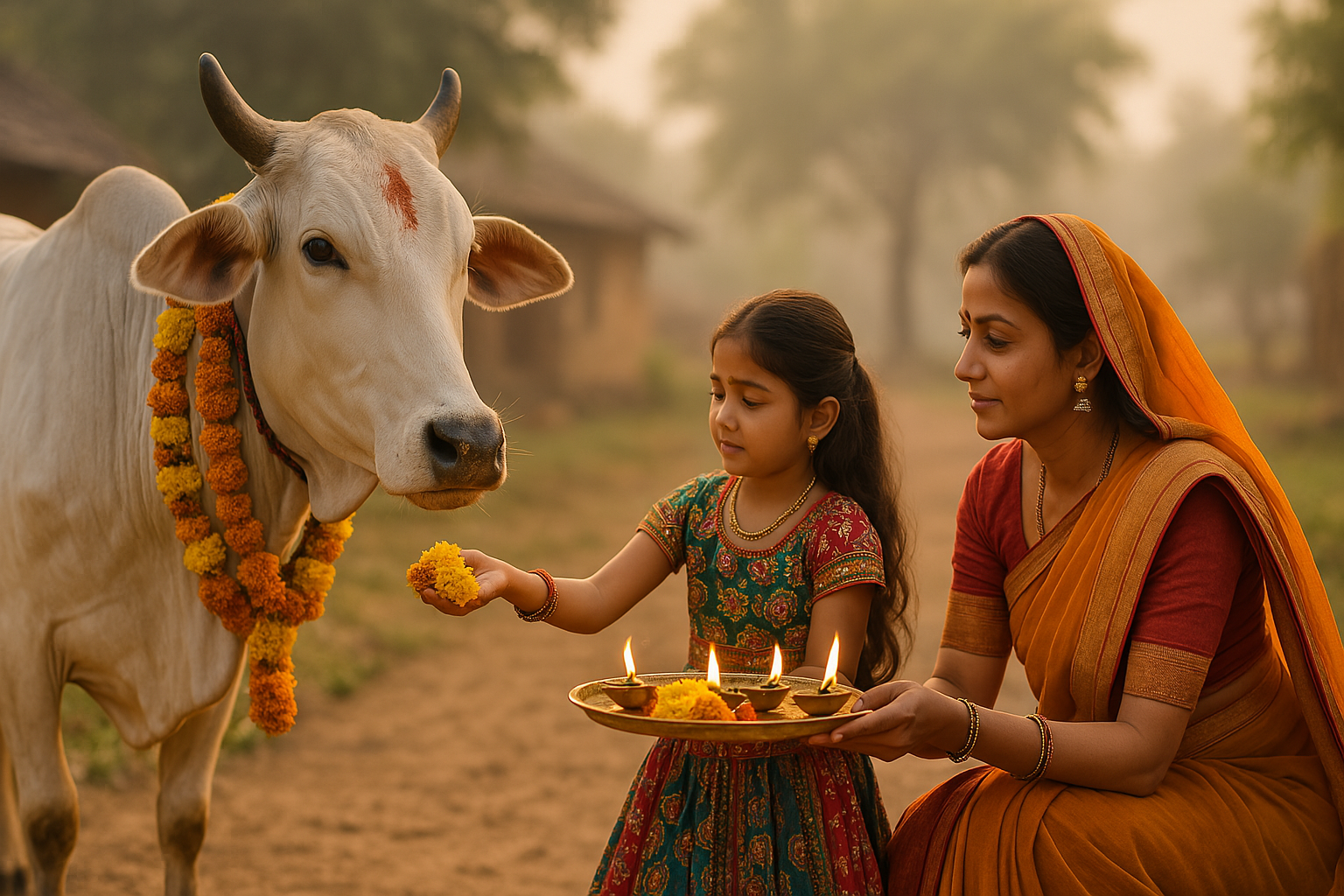In the vast spiritual landscape of India 🇮🇳, few symbols are as powerful and revered as the **cow**. Commonly referred to as “Gau Mata” (Mother Cow) in Hindu culture, the cow holds a place of immense respect, reverence, and love. But why exactly is the cow considered a **mother**? Is it just religious symbolism, or is there a deeper connection that binds this gentle animal to millions of hearts across India and beyond? Let’s explore the multifaceted significance of the cow in Hinduism. 🕉️
🌾 Cultural and Religious Importance of the Cow
In Hinduism, all living beings are seen as part of a divine cosmic order. Among them, the cow is uniquely venerated. It is not merely an animal for Hindus, but a **sacred being**, believed to embody **divine qualities** and linked to several deities, including **Lord Krishna**, who spent his childhood tending cows in Vrindavan 🐮, and **Lord Shiva**, whose companion is Nandi, the sacred bull.
The cow is often described in Hindu scriptures as a symbol of **non-violence, nurturing, and selfless service** — much like a mother. She gives more than she takes and provides essential resources without asking for anything in return. 🥛
🍼 The Cow as a Giver of Life
The primary reason the cow is likened to a mother is simple and practical — she **nourishes** us. For centuries, cow’s milk has been a **source of nutrition** for generations in Indian households. But it doesn't stop at milk. The cow gives us ghee, curd, butter, and even dung and urine, which are used in agriculture, medicine, and religious rituals. 🌿
In Hindu homes, cow milk is used in offerings to gods during pujas, symbolizing purity. Just as a mother feeds her child without expectations, the cow provides for us silently, expecting nothing in return. 🙌
📜 Historical References to Cow Worship
Historical texts like the **Rigveda**, one of the oldest scriptures known to mankind, praise the cow and refer to her as "Aghnya" — not to be killed. It is believed that **Vedic civilization** placed the cow at the center of rural life. The cow was not only essential for sustenance but also for religious rituals, making her a spiritual entity. 📖
Even in ancient India’s festivals and traditions, the cow held a prominent place. For instance, during Ancient Festivals of India, cows were bathed, decorated with garlands, and honored with prayers. These practices continue in many Indian villages today. 🪔
🕊️ Symbol of Non-Violence (Ahimsa)
One of the core principles of Hinduism is Ahimsa — non-violence. The cow, being a gentle and harmless animal, perfectly symbolizes this ideal. Reverence for the cow encourages people to embrace **compassion, kindness, and respect for all life forms**. Mahatma Gandhi, a strong advocate of cow protection, once said, “The cow is a poem of pity.” 🕊️
💫 Spiritual Connection with Deities
In various Hindu stories and epics, cows have played sacred roles. For instance:
- ✨ Lord Krishna is often depicted with a cow, and is called **Govinda** or **Gopala**, meaning protector of cows.
- ✨ Goddess Kamadhenu is a divine cow said to fulfill all desires.
- ✨ The cow is also linked to **Bhoomi Devi**, the Earth goddess, reinforcing the idea that cows are natural nurturers.
🌿 Use of Cow Products in Ayurveda and Rituals
Cow-based products have been a part of Indian wellness and religious systems for thousands of years. In **Ayurveda**, cow urine and dung are believed to have medicinal properties and are used in many traditional treatments. 🔬
In Hindu rituals, cow ghee is used in sacred fire offerings (Yajnas), considered to purify the environment and attract positive energies. 🌞
🏠 Cow in Indian Household and Rural Economy
Especially in rural India, a cow is like a family member. Beyond spiritual and health benefits, cows contribute significantly to the economy — providing **organic fertilizer**, **fuel (dried dung)**, and **natural pest repellents**. 🐄
Even today, many households mark special days to worship cows and decorate them with vibrant paints and flowers during festivals like Govardhan Puja and Gopashtami. During Raksha Bandhan, some traditions include tying rakhis to cows and bulls, honoring them as protectors. 🎁
🙏 Why is the Cow Called "Gau Mata" (Mother Cow)?
In Indian tradition, the term “Mata” or “Mother” is not used lightly. It is reserved for those who nurture, protect, and love unconditionally. The cow is seen as one who performs all these duties without a single complaint. This unconditional service places her in the same status as one's biological mother.
Respecting and serving the cow is considered a **spiritual act**, one that brings peace, prosperity, and harmony into one’s life and home. 🕉️
💭 Final Thoughts
The reason why the **Hindu cow is called a mother** goes beyond religion — it is a blend of **culture, spirituality, ecology, and gratitude**. She is a provider, a healer, a nurturer, and a silent guardian of rural Indian life. In a world striving for sustainability, the values associated with cow worship — non-violence, love for nature, and giving back — are more relevant than ever. 🌍
So next time you hear someone refer to the cow as "Gau Mata", remember — it's not just a title; it's a heartfelt expression of reverence, respect, and eternal gratitude. 🙏🐄

